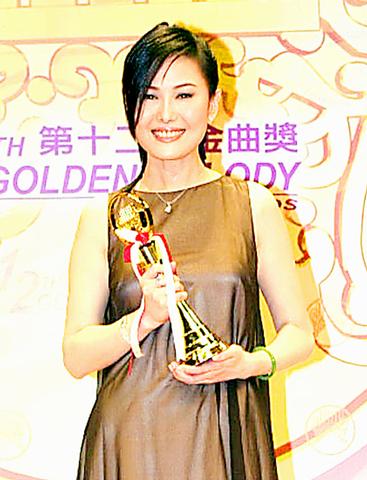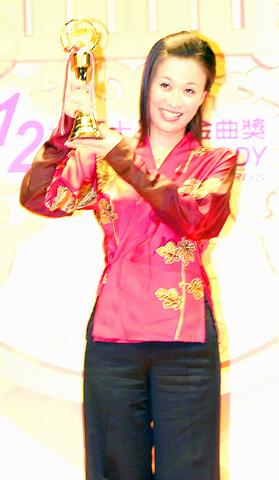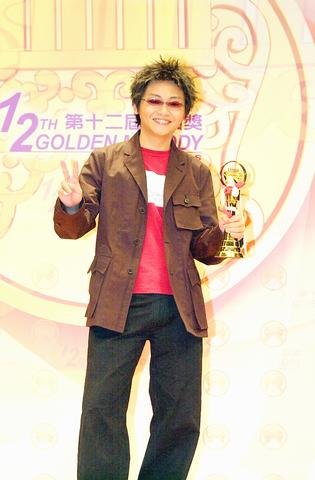In a competition in which mainstream artists with strong sales dominated, Adia (
The best album went to newcomer Jay Chou (

Na Ying (

PHOTO: TAIPEI TIMES
In the eyes of the music industry, where money is the bottom line, the male nominees are small potatoes compared to the women. "Females have much higher recognition," said Perry Ko (
Taiwan's top seller at Tower Records in 2000 was Faye Wong (

PHOTO: TAIPEI TIMES
"The market for female singers is much, much bigger than the market for the guys," said Ko. "There's kind of a weird split. Female pop singers get both guys and girls buying their albums, but male pop singers only get women buying the records."

PHOTO: TAIPEI TIMES
In a predictable award ceremony, in many categories, winners seemed to be selected on their record sales, with mainstream artists pushing out less famous names. A massive crowd attended the gathering, held for the first time in the event's 12-year history in Kaohsiung. The broadcasting rights for the event, which for the last three years have been held by TVBS, were taken for the first time by ETTV.
In an early surprise, Sun Yan-zi (

PHOTO: TAIPEI TIMES
Occasionally lapsing into English, the Singapore native said she was "surprised," "very happy," and that she appreciated the support and friendship of the other nominees.
Sun's fame has grown rapidly over the last two years, and a career comprised of only two CDs and a string of TV commercials has been sufficient to make her a star.
The conservatism of this year's Golden Melody Awards was further revealed by Chiang Hui's (
According to Ma Nien-hsien (
Sticky Rice was praised at the beginning of the award ceremony by Kaohsiung mayor Frank Hsieh (謝長廷) as "representing a new element in Taiwan." Despite this, the trend toward picking big names was working against the group. Last year, there had been criticism that many of the winners were relatively unknown in the mainstream, and this year judges seem to have gone out of their way to pick only those groups that have been moving CDs in the stores.
Speaking after receiving their award, Ah Hsin (
While there were good crowds attending the event, some members of the public did give voice to the idea that such mainstream festivals did not altogether reflect their musical interests. "I like Jay Chou (
Liu Chia-chang (劉家昌), one of Taiwan's most prolific writer of golden oldies, received a lifetime achievement award. As the writer of the hit In Praise of the Republic of China (中華民國頌) and other patriotic songs, he spoke about how, under the DPP government, people now tiptoe around the name "Republic of China." This caused some embarrassment for the presenter of the award, the deputy director general of the Government Information Office.
Another usually minor category was for Best Classical Music, in which category the soundtrack for Crouching Tiger, Hidden Dragon was knocked out of the competition because it was not pure classical music, according to the judges. Officials said that a new movie soundtrack category may be incorporated in next year's event.

Towering high above Taiwan’s capital city at 508 meters, Taipei 101 dominates the skyline. The earthquake-proof skyscraper of steel and glass has captured the imagination of professional rock climber Alex Honnold for more than a decade. Tomorrow morning, he will climb it in his signature free solo style — without ropes or protective equipment. And Netflix will broadcast it — live. The event’s announcement has drawn both excitement and trepidation, as well as some concerns over the ethical implications of attempting such a high-risk endeavor on live broadcast. Many have questioned Honnold’s desire to continues his free-solo climbs now that he’s a

As Taiwan’s second most populous city, Taichung looms large in the electoral map. Taiwanese political commentators describe it — along with neighboring Changhua County — as Taiwan’s “swing states” (搖擺州), which is a curious direct borrowing from American election terminology. In the early post-Martial Law era, Taichung was referred to as a “desert of democracy” because while the Democratic Progressive Party (DPP) was winning elections in the north and south, Taichung remained staunchly loyal to the Chinese Nationalist Party (KMT). That changed over time, but in both Changhua and Taichung, the DPP still suffers from a “one-term curse,” with the

Jan. 26 to Feb. 1 Nearly 90 years after it was last recorded, the Basay language was taught in a classroom for the first time in September last year. Over the following three months, students learned its sounds along with the customs and folktales of the Ketagalan people, who once spoke it across northern Taiwan. Although each Ketagalan settlement had its own language, Basay functioned as a common trade language. By the late 19th century, it had largely fallen out of daily use as speakers shifted to Hoklo (commonly known as Taiwanese), surviving only in fragments remembered by the elderly. In

Lines between cop and criminal get murky in Joe Carnahan’s The Rip, a crime thriller set across one foggy Miami night, starring Matt Damon and Ben Affleck. Damon and Affleck, of course, are so closely associated with Boston — most recently they produced the 2024 heist movie The Instigators there — that a detour to South Florida puts them, a little awkwardly, in an entirely different movie landscape. This is Miami Vice territory or Elmore Leonard Land, not Southie or The Town. In The Rip, they play Miami narcotics officers who come upon a cartel stash house that Lt. Dane Dumars (Damon)